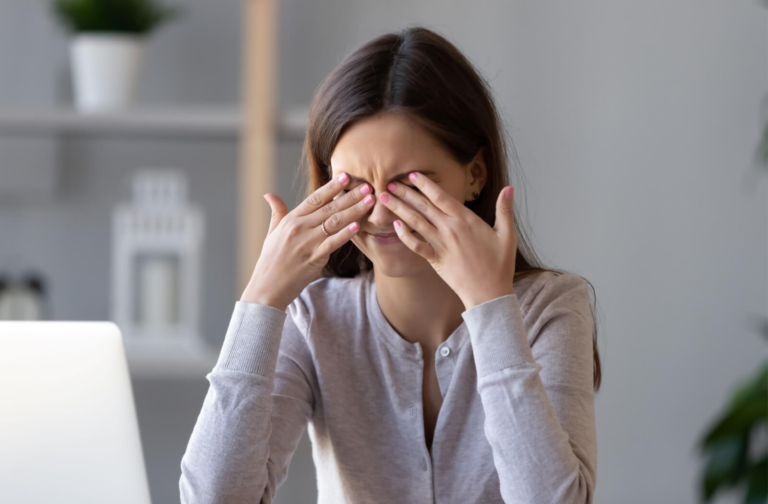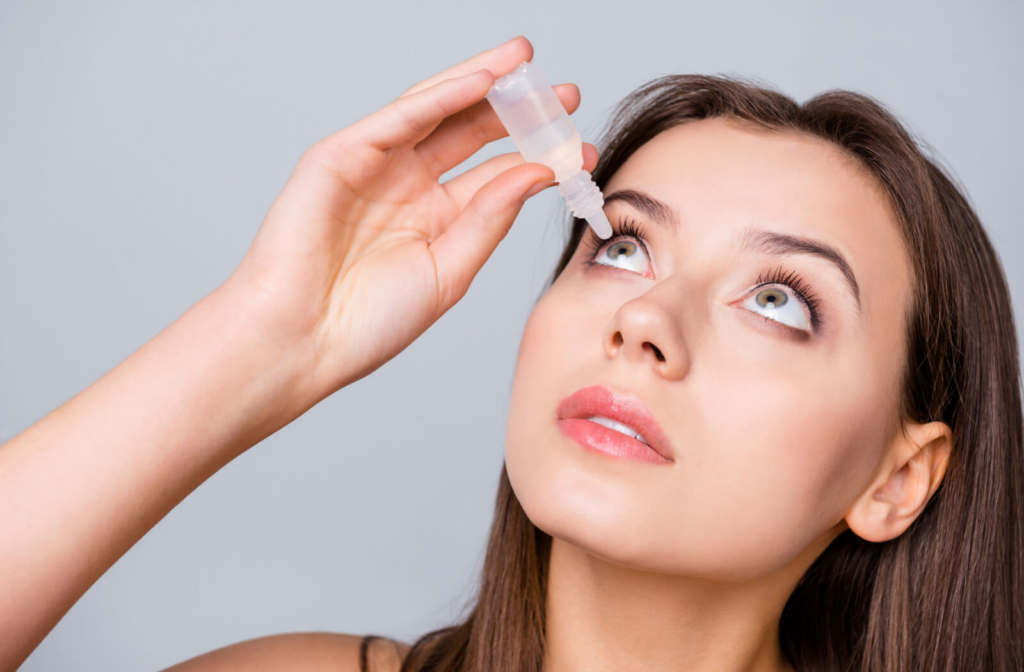Table of Contents

Introduction
If you’ve been experiencing dry, uncomfortable, and itchy eyes, it’s natural to wonder if allergies are the culprit. Allergies can contribute to dry eye symptoms, which an optometrist can diagnose. However, there could be other reasons your eyes feel dry and uncomfortable.
How Do Allergies Affect Your Eyes?
Individuals can develop an allergic reaction when exposed to substances like pollen, dust mites, and pet dander that their body perceives as a threat.
The body responds by releasing histamine, which can lead to irritated, watery eyes and sneezing. These symptoms arise as histamine signals to the blood vessels, making them expand and leak fluid into various tissues. The eyes’ conjunctiva (the thin, clear membrane that protects your eye) becomes swollen, leading to redness and puffiness.
Other Causes of Dry Eyes
Many other factors can cause dry eyes, including:
- Environmental: The environment can affect dry eye symptoms in various ways. For example, hot and dry houses in winter or air-conditioned homes in summer can lead to dryness. Windy, smoky, and dry climates can also play a part in causing dryness.
- Medication: Certain medications like antihistamines, antidepressants, decongestants, and hormone replacement therapies may cause dry eye as a side effect.
- Age: As we age, our tear production slows, leading to dryness.
- Gender: Women may be more susceptible to developing dry eyes due to hormonal changes.
- Systemic disorders: Systemic disorders like Sjögren’s syndrome or lupus are often linked to dry eyes, alongside other conditions like diabetes, thyroid imbalances, and vitamin A deficiency.
It is essential to monitor all these risk factors so if you experience any dry eye symptoms, they are identified early and treated accordingly.
How Dry Eyes Is Diagnosed
The best course of action is to consult an eye doctor to determine if allergies are causing your dry eyes or if there is another explanation responsible for them.
Diagnosing and treating dry eyes usually begins with a comprehensive eye exam. Your optometrist may perform tests to measure the quality of your tears to identify where your dry eye symptoms are coming from.

Treatment Options for Dry Eyes
Many options are available for treating dry eyes. Since many people have not been educated on proper eyelid hygiene and cleaning, there is often decades of build up by the time symptoms arise. An in office deep cleaning to return to a comfortable baseline, alongside at-home treatments, are most effective. You can work closely with your eye doctor to find a treatment plan that best suits your needs.
These are a few of the options available:
LipiFlow
LipiFlow is a treatment that uses a specialized device that applies heat and pressure to the meibomian glands to help them produce the oils that keep your eyes lubricated and comfortable.
LipiFlow can help you experience relief from dry eye symptoms for up to 3 years.
TearCare
TearCare is a treatment option that uses heat therapy to help stimulate the production of natural tears. This treatment is done in-office and applies gentle heat to the inside of the eyelids, which helps to unclog blocked glands to improve the flow of natural tears.
TearCare and LipiFlow both use heat therapy and gentle massage to unblock glands, but they do this in slightly different ways. Talking to your optometrist about these options will give you the information you need to make the best decision for your dry eye needs.
Prescription Medication
In some cases, doctors may prescribe medication to help manage dry eye symptoms. These medications can include eye drops or oral medications that help reduce inflammation and increase the amount of natural tears produced by the eyes.
IPL
Intense pulsed light therapy (IPL) is an in-office treatment that reduces inflammation and improves the function of the meibomian glands.
Other treatment solutions are available.
Treating Dry Eyes at Golden Vision Optometry
Allergies are one of many potential causes of dry eyes. However, dry eye disease is a complicated condition with many causes, so it’s essential to visit your optometrist for a proper examination. They can diagnose the cause of your condition and put together a personalized treatment plan designed to treat the root of the problem, not just the symptoms. It’s important to remember that other risk factors, such as your environment, medication, age, gender, and systemic issues, can contribute to dry eye symptoms.
By working closely with your eye doctor, you can experience relief from your dry eye discomfort and improve your overall eye health.
At Golden Vision Optometry, we understand the importance of personalized care that caters to your unique needs. Our optometry team can help identify the underlying cause of your dry eye symptoms and develop a treatment plan that works for you.
Contact us today to take the first step towards healthier, more comfortable eyes.

